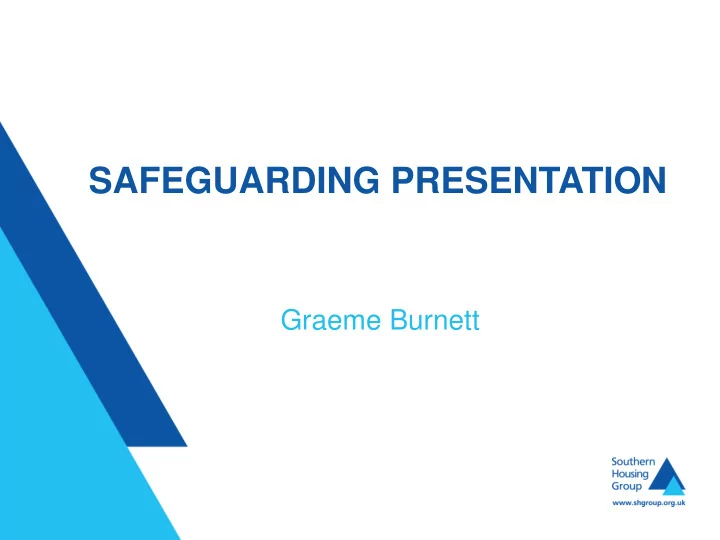

SAFEGUARDING PRESENTATION Graeme Burnett
Content • Introduction to Southern Housing Group • What does the Group do • Regulators • Services on the Isle of Wight • Safeguarding Lead • Commitment • Partnership working • Challenges • Quarterly statistics • External Audit • Comments and Questions
WHO WE ARE • One of the largest housing associations in Southern England • Own and manage over 25,000 homes to more than 60,000 residents • Employ over 900 people • Work with over 80 local authorities
WHAT WE DO • Develop quality affordable housing • Provide range of options for rent and home ownership • More than 200 staff deliver personalised and high quality care and support to vulnerable people in a variety of settings
REGULATORS • The Homes & Communities Agency • Non-departmental body and regulator of all social housing providers in England • Key activities include governance, financial viability and value for money, setting of consumer standards • Provision of investment in new affordable housing and improving existing social housing • Intervention • Care Quality Commission • Supporting People
SERVICES ON THE ISLE OF WIGHT • General needs housing to more than 3,000 people • Care, support and housing management to more than 500 residents in supported and sheltered housing, extra care and residential care • Care and support to more than 400 customers in the community • Customer groups: learning disabilities, autism, mental health, older people, young people, frail elderly, homeless individuals and families, single parents
SAFEGUARDING LEAD • Head of Services to vulnerable people on the Island • Strategic guidance Group wide • Delivery of mandatory annual training for all care and support staff on the Island • Quarterly reports to the Group Strategy Team • Annual review of policies and procedures • Monitoring alerts • Contractual and regulatory compliance • Co-ordinating attendance at external training sessions and conferences
COMMITMENT • Mandatory training for all staff Group wide • Thorough reporting and data collation processes • Legal compliance with the Care Act • Representation on IW Safeguarding Board • Operational Tool kits • Customer awareness and feedback – Making Safeguarding Personal • Working practices reflect SAB framework and multi agency policy • Robust checking processes for staff • Staff handbook • Supervisions and team meetings promote discussion on current cases
PARTNERSHIP WORKING • Information sharing and service level agreements • Independent representation • Working together on Group supported housing premises • LA Safeguarding Team • Case conferences and strategy meetings • Knowing and understanding the customer • Learning lessons
QUARTERLY STATISTICS • A total of 44 alerts were made to Safeguarding in the last quarter to 30 th June 2016 involving suspected or actual incidents • The greatest number of referrals made were in relation to physical and emotional abuse and self neglect • The majority of alerts referred to customers living in the community • Only 3 alerts were in respect of customers receiving no care and support service • For those customers receiving a support and care service from us, the greatest number of alerts related to Young People and Mental Health services • From June 2015 to June 2016 we received a total of 159 Safeguarding referrals, 115 of these have now been resolved
CHALLENGES • Reductions in funding • Living environment and breach of occupancy agreements • Lack of regulation – support to vulnerable people with personal budgets • Demise of the Forums • Lower level support needs • Housing Provider awareness - The Care Act and Mental Capacity • Learning from Adult Safeguarding Reviews • Achieving a safeguarding culture • Board representation – housing sector
EXTERNAL AUDIT OF SAFEGUARDING Key findings and actions: • Increase Group representation on SA Boards • Increase Group representation at case conferences • Introduce a Safeguarding Lead for each region • Increase multi agency working • Develop joint working with other housing providers • Review policies and procedures to include reporting processes specific to each local authority • Review use of volunteers • Monitor programme of e learning to include staff induction
Recommend
More recommend